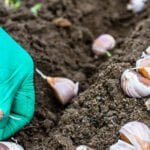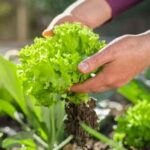What is a good organic fertilizer for vegetable gardens? Organic fertilizers play a crucial role in ensuring the health and productivity of vegetable gardens. They provide essential nutrients to the soil, promoting robust plant growth and bountiful harvests.
In this article, we will explore the benefits of organic fertilizers, delve into the nutritional needs of vegetable gardens, discuss different types of organic fertilizers, and offer best practices for their use. Whether you are a seasoned gardener or new to organic gardening, understanding the importance of organic fertilizers is key to achieving flourishing vegetable crops.
Organic fertilizers are vital for nourishing vegetable gardens as they improve soil structure, enhance water retention, and promote healthy microbial activity. Unlike synthetic fertilizers that may contain harmful chemicals, organic fertilizers are derived from natural sources and are environmentally friendly.
By using organic fertilizers, gardeners can rest assured that their vegetables are grown in a sustainable and safe manner. Additionally, these types of fertilizers contribute to the overall health of the soil by providing slow-release nutrients that benefit both plants and earthworms.
Vegetable gardens have specific nutritional requirements that differ from those of ornamental plants. Understanding these needs is essential for successful gardening. Balancing nitrogen, phosphorus, and potassium levels in the soil is crucial for achieving optimal growth and yield in vegetables.
It is important to tailor the choice of organic fertilizer to meet these specific requirements for each type of vegetable being grown in the garden. Stay tuned as we explore different types of organic fertilizers suitable for various vegetables and learn about best practices for using them effectively in your garden.
Understanding the Nutritional Needs of Vegetable Gardens
When it comes to maintaining a healthy and thriving vegetable garden, understanding the nutritional needs of the plants is crucial. Vegetables require a balanced combination of essential nutrients to support their growth, development, and production. By ensuring that the soil contains the right levels of key nutrients, gardeners can promote strong, disease-resistant plants and bountiful harvests.
Essential Nutrients for Healthy Vegetable Growth
In order to thrive, vegetable plants require several key nutrients, including nitrogen (N), phosphorus (P), and potassium (K). Nitrogen is essential for promoting lush foliage and vigorous vegetative growth. Phosphorus supports root development, flowering, and fruiting in vegetables. Potassium plays a vital role in overall plant health, contributing to disease resistance and stress tolerance. Additionally, vegetables also benefit from secondary nutrients such as calcium, magnesium, and sulfur, as well as micronutrients like iron, zinc, and manganese.
Balancing Nutrient Levels in the Soil
Achieving the right balance of nitrogen, phosphorus, and potassium in the soil is critical for meeting the nutritional needs of vegetable plants. While nitrogen is typically needed in larger quantities during active growth stages, excessive levels of this nutrient can lead to prolific foliage at the expense of fruit production. Similarly, an imbalance in phosphorus levels can result in poor root development and limited fruit set.
Potassium helps to regulate nutrient uptake by plants and plays a key role in overall plant health. By conducting soil tests and adjusting fertilization practices accordingly, gardeners can ensure that their vegetable gardens have optimal nutrient levels for successful growth and harvests.
Types of Organic Fertilizers for Vegetable Gardens
When it comes to choosing the right organic fertilizer for your vegetable garden, there are several options to consider. Each type of organic fertilizer has its own unique benefits and drawbacks, so it’s important to understand the differences in order to make an informed decision for your garden.
Compost
One of the most popular and widely used organic fertilizers is compost. Compost is made from decomposed organic matter such as kitchen scraps, yard waste, and plant materials. It is rich in essential nutrients and beneficial microorganisms, making it an excellent choice for improving soil fertility and structure.
Compost also helps retain moisture in the soil and can enhance its overall health. However, one drawback of using compost is that it takes time to fully break down and become available to plants, so it should be added to the soil well in advance of planting.
Manure
Another commonly used organic fertilizer for vegetable gardens is manure. It provides a good source of nitrogen, phosphorus, and potassium, as well as other essential nutrients needed for plant growth. Manure can come from a variety of animals such as cows, horses, chickens, or even bats. While manure can be very effective in enriching the soil, it must be aged or composted before use to avoid potential issues with pathogens or excess salts that may harm plants.
Fish Emulsion
Fish emulsion is a liquid organic fertilizer made from processed fish by-products. It is high in nitrogen and provides a quick nutrient boost to plants when applied. Fish emulsion is easily absorbed by plant roots and can help promote healthy foliage growth. However, due to its strong odor, some gardeners may find it unpleasant to use. Additionally, fish emulsion should be used sparingly as excessive application may lead to nutrient imbalances in the soil.
Understanding the benefits and drawbacks of these different types of organic fertilizers can help you choose the best option for your specific vegetable garden needs. Whether you opt for compost, manure, fish emulsion or another type of organic fertilizer altogether – ensuring a good balance of nutrients in your soil will result in healthy and thriving vegetable crops.
Best Practices for Using Organic Fertilizers
Organic fertilizers are essential for maintaining the health and productivity of vegetable gardens. When it comes to using organic fertilizers, there are certain best practices that can help ensure optimal results. Proper application of organic fertilizers not only provides essential nutrients to the vegetables but also contributes to the overall health of the soil.
To start, it is important to conduct a soil test before applying any organic fertilizer. This will help determine the current nutrient levels in the soil and identify any deficiencies that need to be addressed. Understanding the nutritional needs of the specific vegetables being grown will also guide in choosing the right type of organic fertilizer and determining the appropriate application rates.
When applying organic fertilizers, it is crucial to follow recommended guidelines for timing, frequency, and quantity. For example, some organic fertilizers may need to be applied before planting, while others can be used as a topdressing during the growing season. Over-fertilization should be avoided as it can lead to nutrient imbalances and potentially harm the plants. It’s also important to water the garden after applying organic fertilizer to ensure that nutrients are properly distributed in the soil.
In addition to proper application techniques, it’s beneficial to incorporate other soil enrichment practices such as composting and mulching in conjunction with organic fertilizer use. These practices support soil health by improving its structure, moisture retention, and microbial activity – all of which contribute to better vegetable yields and quality. By following these best practices for using organic fertilizers, vegetable gardeners can promote healthy plant growth while maintaining sustainable gardening practices.
Importance of Soil Health and Organic Fertilizers
Organic fertilizers are not only beneficial for the growth of vegetables but also play a crucial role in maintaining the overall health of the soil. Unlike chemical fertilizers, organic options improve soil structure and texture, increase its ability to hold water and nutrients, and promote beneficial microbial activity. This focus on soil health leads to long-term sustainability and improved growing conditions for vegetable gardens.
One key aspect of organic fertilizers is their ability to enhance soil fertility without causing harm to the ecosystem. Chemical fertilizers can leach into the groundwater or disrupt the balance of microorganisms in the soil. On the other hand, organic fertilizers promote a healthy and diverse population of microbes that create a sustainable environment for plant growth. Additionally, they improve the long-term productivity and resilience of the soil by replenishing essential nutrients over time.
Incorporating organic fertilizers into vegetable gardens also reduces the risk of nutrient run-off, which can be detrimental to local waterways and ecosystems. By focusing on soil health through organic fertilizer use, gardeners can contribute to environmental conservation efforts while reaping the benefits of increased crop yields and better-tasting produce.
| Benefit | Explanation |
|---|---|
| Improved Soil Structure | Organic fertilizers enhance soil texture and water retention capacity. |
| Promotes Beneficial Microbial Activity | Organic options encourage a healthy population of microbes in the soil that aid in plant growth. |
| Reduces Nutrient Run-off | Organic fertilizers minimize the risk of harmful nutrient run-off into waterways. |
Common Mistakes to Avoid When Using Organic Fertilizers
When using organic fertilizers in vegetable gardens, there are common mistakes that gardeners should be mindful of to ensure optimal plant growth and soil health. Avoiding these pitfalls can help maximize the benefits of organic fertilizers and prevent any potential negative impacts on the garden ecosystem.
1. Over-fertilization: One of the most common mistakes when using organic fertilizers is applying too much product to the soil. Over-fertilizing can lead to nutrient imbalances, excessive salt buildup, and even damage to plant roots. It is important to follow recommended application rates and avoid the temptation to use more fertilizer than necessary.
2. Improper application: Another mistake to avoid is improperly applying organic fertilizers. This can include uneven distribution, failure to mix the fertilizer into the soil, or applying it too close to plant stems. Properly blending the fertilizer into the top layer of soil and irrigating afterward helps ensure that the nutrients are available to plant roots.
3. Ignoring soil testing: Neglecting to test the soil before applying organic fertilizers is a common mistake that can impact plant health and overall garden productivity. Conducting a soil test can provide valuable information about nutrient levels, pH balance, and organic matter content, which can guide decisions about the type and amount of organic fertilizer needed for specific crops.
By being mindful of these common mistakes when using organic fertilizers in vegetable gardens, gardeners can promote healthy plant growth, improve soil fertility, and contribute to sustainable gardening practices.
- Over-fertilization
- Improper application
- Ignoring soil testing
Homemade Organic Fertilizer Recipes
If you’re looking to create your own organic fertilizer for your vegetable garden, there are several simple and effective recipes that you can utilize. Making homemade organic fertilizers not only allows you to control the ingredients that go into your soil, but it also reduces waste by utilizing items you may already have at home. Here are a few easy DIY organic fertilizer recipes to try:
- Compost Tea: Compost tea is a fantastic all-purpose fertilizer that provides a boost of nutrients to your veggies. To make compost tea, simply soak finished compost in water for a few days, then strain the liquid and apply it to the soil around your plants.
- Banana Peel Fertilizer: Banana peels are rich in potassium and other minerals that benefit plant growth. Simply chop up banana peels into small pieces, bury them in the soil near your plants, and allow them to decompose over time.
- Eggshell Fertilizer: Eggshells are an excellent source of calcium, which is essential for preventing blossom end rot in tomatoes and peppers. Crush cleaned eggshells into fine pieces and sprinkle them around the base of your plants.
These homemade organic fertilizers provide essential nutrients to your vegetable garden while also promoting sustainability and reducing your carbon footprint.
By creating your own organic fertilizers at home, you can ensure that your vegetables receive the necessary nutrients without resorting to chemical-based options. Additionally, these DIY fertilizers offer an affordable alternative to store-bought products while allowing you to embrace eco-friendly practices in gardening. With just a few simple ingredients from your kitchen, you can contribute to the health and vitality of your vegetable garden using homemade organic fertilizers.
Recommended Organic Fertilizers for Different Types of Vegetables
In conclusion, choosing the right organic fertilizer is essential for the health and productivity of vegetable gardens. The use of organic fertilizers not only provides essential nutrients to the soil but also contributes to overall soil health, which in turn leads to better vegetable yields and quality. Understanding the nutritional needs of different types of vegetables is crucial in determining the best organic fertilizer to use, as each plant has specific requirements for optimal growth.
There are various types of organic fertilizers available, including compost, manure, and fish emulsion, each with its own set of benefits and drawbacks. It is important for gardeners to consider these factors when selecting the most suitable organic fertilizer for their vegetable garden. Additionally, following best practices for using organic fertilizers, such as proper application techniques and timing, will ensure that the plants receive the necessary nutrients without causing harm to the soil or environment.
Furthermore, it is worth noting that homemade organic fertilizers can be a cost-effective and sustainable option for vegetable gardeners. DIY recipes using household items can provide an alternative to store-bought organic fertilizers.
By customizing fertilizer blends based on the specific needs of different vegetable varieties, gardeners can optimize their fertilizer usage and support healthy plant growth. Ultimately, by prioritizing soil health and choosing the right organic fertilizers for their vegetable gardens, gardeners can enjoy a bountiful harvest of nutritious and delicious produce.
Frequently Asked Questions
What Is the Best Organic Fertilizer for My Vegetable Garden?
The best organic fertilizer for your vegetable garden will depend on the specific needs of your plants and soil. Generally, compost is a great all-purpose organic fertilizer that provides a rich source of nutrients for vegetables. Additionally, options like well-aged manure, bone meal, seaweed or fish emulsion, and cottonseed meal can also be effective choices for organic fertilization.
How Do I Fertilize My Vegetable Garden Organically?
Fertilizing your vegetable garden organically involves using natural materials to provide essential nutrients to your plants. You can start by amending your soil with compost or well-rotted manure to improve its fertility and structure.
In addition, you can use organic liquid fertilizers or top dressings such as kelp meal, alfalfa meal, or other plant-based options to provide a steady supply of nutrients throughout the growing season.
What Is the Best Fertilizer for Peppers and Tomatoes?
Peppers and tomatoes have specific nutrient requirements that can be met with suitable fertilizers for these crops. For peppers and tomatoes, an organic fertilizer high in phosphorus (the middle number on the label) can encourage healthy fruit development.
Look for a fertilizer labeled for flowering and fruiting vegetables and follow the application instructions to ensure proper nourishment for your pepper and tomato plants throughout their growth cycle.

If you’re looking to get into vegetable gardening, or are just looking for some tips on how to make your current garden better, then you’ve come to the right place! My name is Ethel and I have been gardening for years. In this blog, I’m going to share with you some of my best tips on how to create a successful vegetable garden.





